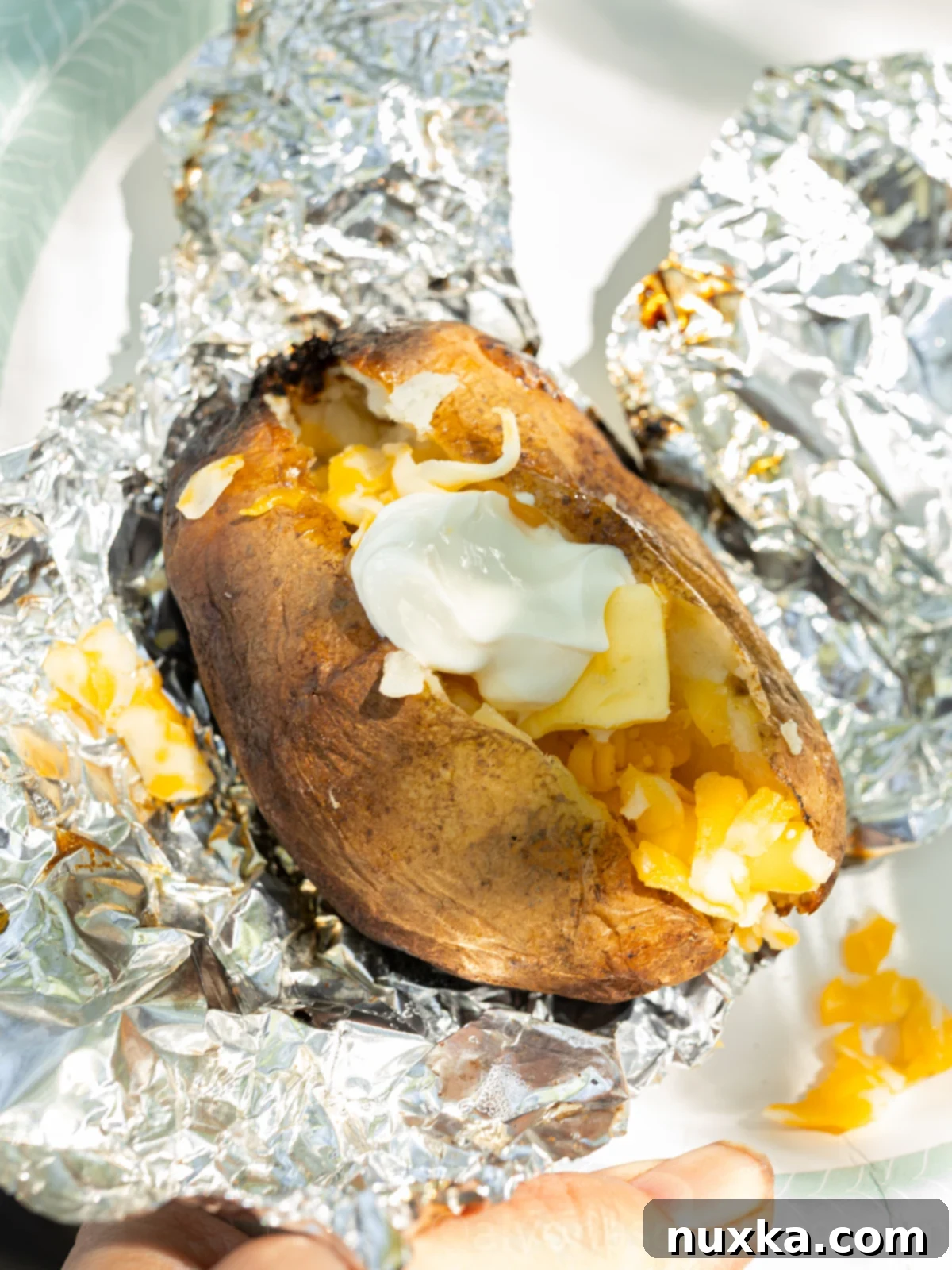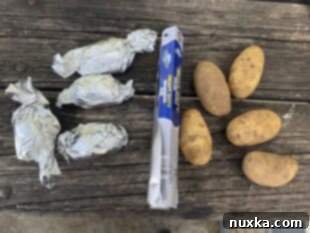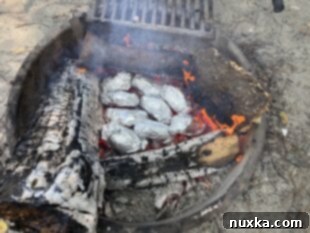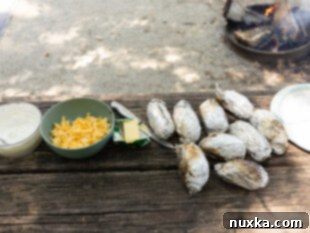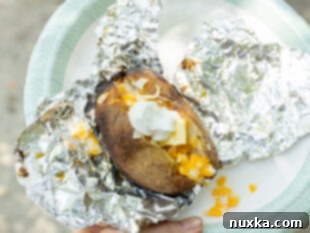How to Cook the Best Campfire Baked Potatoes: An Easy & Hearty Camping Recipe
There’s nothing quite like the crackling sound of a campfire on a cool evening, especially when it’s cooking up a delicious meal. Among the easiest and most satisfying camping recipes, campfire baked potatoes stand out as a true outdoor classic. Requiring minimal effort and just a few simple ingredients, they transform into incredibly filling and comforting dishes, perfectly topped with butter, sour cream, and cheese. The beauty of this meal is its simplicity: everyone can customize their own potato, and clean-up is a breeze, leaving more time for enjoying the great outdoors.
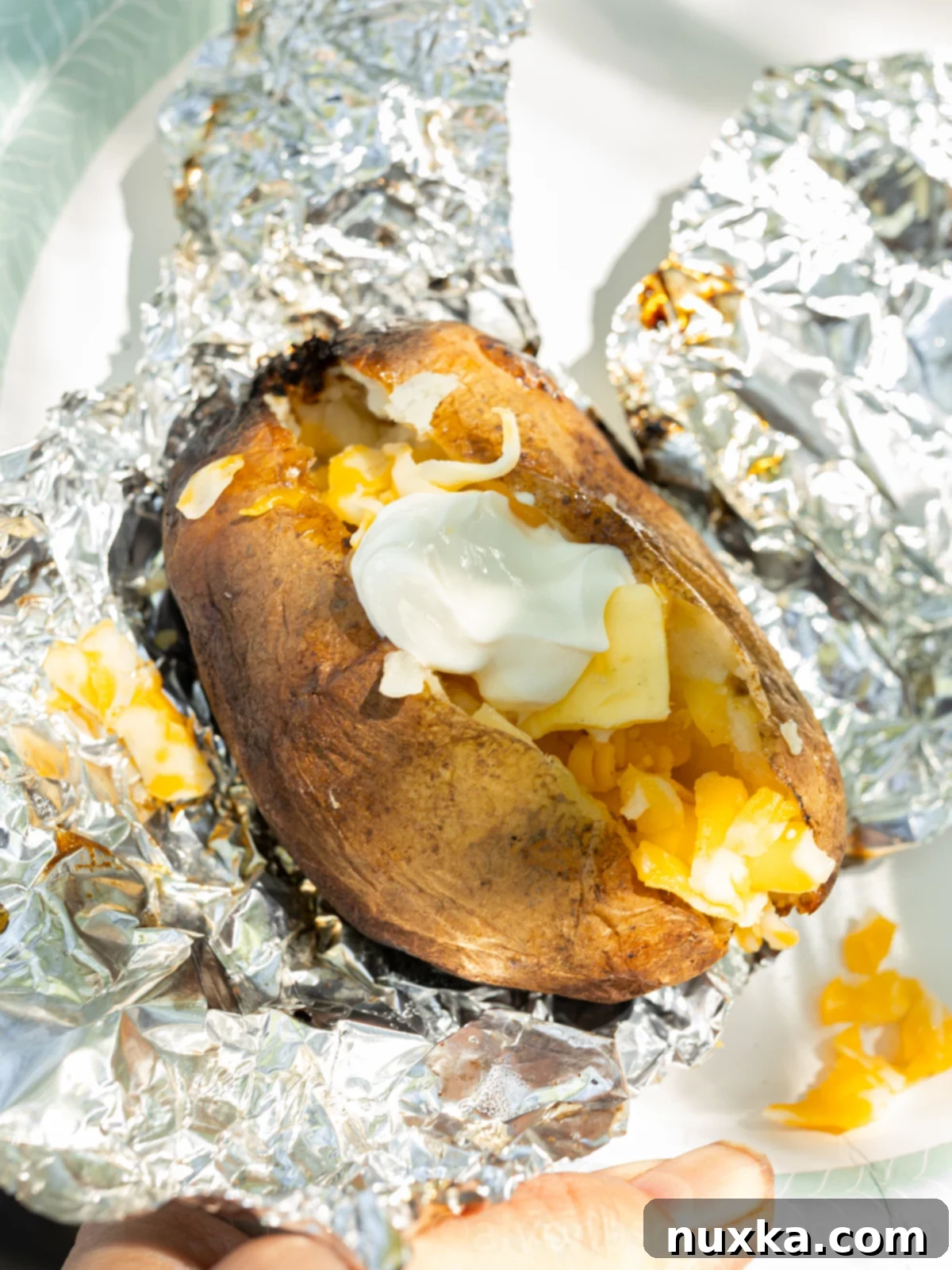
Over the years, our family has returned to these tried-and-true campfire recipes time and again because they consistently deliver delicious results and bring everyone together. Alongside these simple baked potatoes, we also love making Woof-em Sticks (fun campfire tacos), Mountain Pies (savory campfire hot sandwiches), and our hearty Campfire Breakfast Potatoes, which are usually served with crispy bacon and perfectly fried eggs. These dishes truly make camping meals memorable and enjoyable for all.
Why Campfire Baked Potatoes Are the Ultimate Camping Meal
For us, fall is the quintessential camping season. There’s an undeniable coziness in gathering around a crackling fire on a crisp day, cooking and sharing meals with family. When it comes to outdoor cooking, I prioritize simplicity so that I can fully immerse myself in the natural beauty and relaxation of camping. This is precisely why baked potatoes have become a staple in our camping repertoire.
Beyond camping, the versatility of campfire baked potatoes has proven incredibly useful. I still recall when Hurricane Helen left us without power; these baked potatoes were a lifesaver, providing a warm, comforting, and filling meal when other cooking options were unavailable. We’ve even recreated the magic by making them in our home fireplace for a fun and unique weeknight dinner. It just goes to show how adaptable and reliable this cooking method can be.
One of the great advantages of cooking baked potatoes over a fire is their speed. They tend to cook faster than in a conventional oven, significantly streamlining mealtime. What truly elevates them, however, is their hearty nature and endless customization possibilities. A baked potato can be loaded up any way you desire, transforming a simple spud into a gourmet meal. My personal favorite combination includes generous amounts of rich, salted Irish butter, a dollop of cool sour cream, a sprinkle of shredded cheese, and a handful of crispy bacon bits. While you can always add salt and pepper, I often find that the natural saltiness from the bacon and quality Irish butter provides ample flavor without needing extra seasoning.
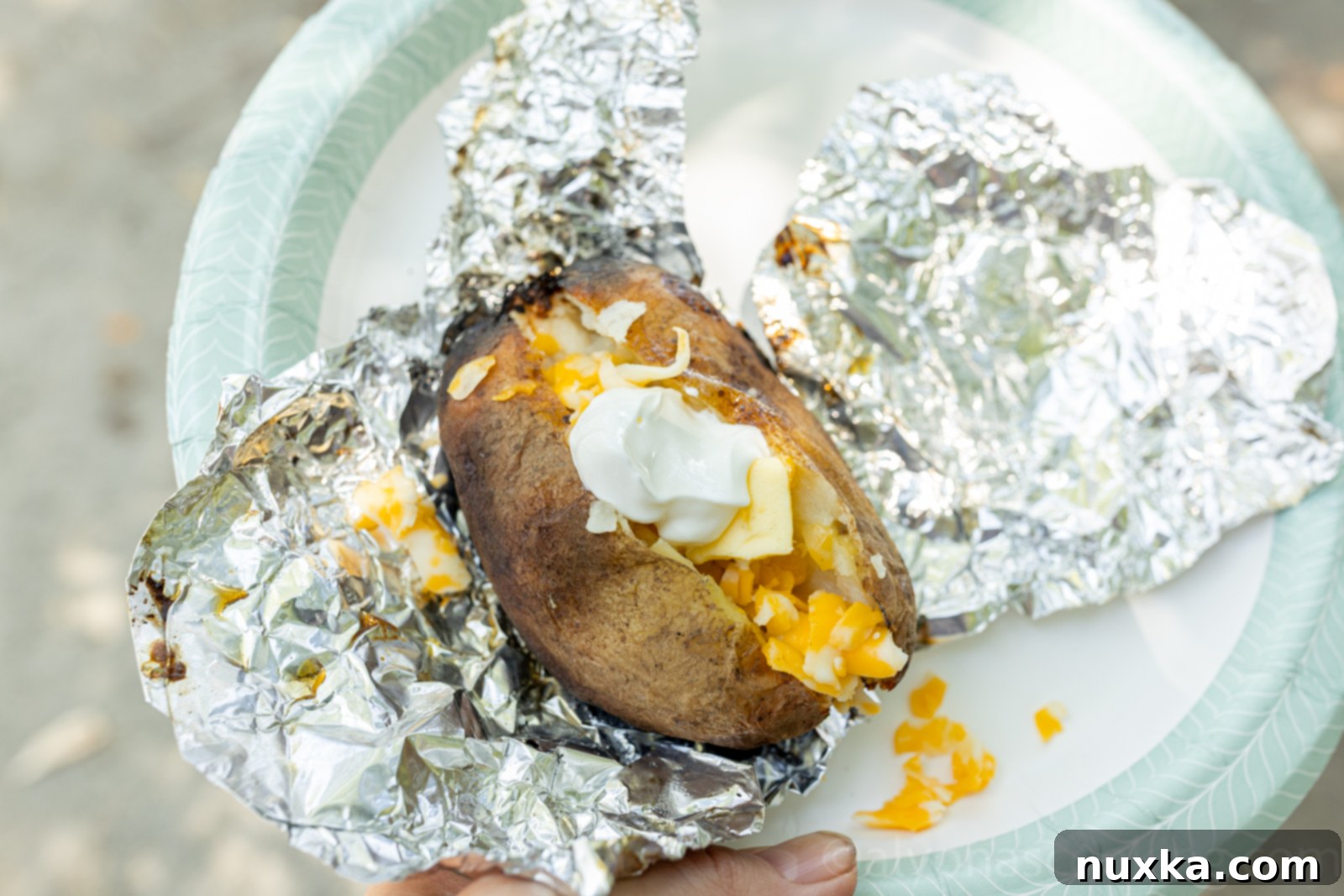
Mise en Place: Essential Equipment and Ingredients for Perfect Campfire Potatoes
Equipment You’ll Need:
- Heavy-duty aluminum foil: This is crucial for protecting your potatoes from burning and ensuring even cooking. Standard foil might tear, leading to charred spots.
- Heavy duty paper plates: Disposable plates make serving and clean-up incredibly easy, a major plus for camping.
- Sharp knife: For carefully pricking the potatoes (if not eating skins) and for slicing open the cooked potato.
- Long Grilling Tongs: Essential for safely handling hot potatoes over and in the campfire embers. Alternatively, sturdy sticks found at the campground can be used.
- Heat-resistant gloves or oven mitts: For added safety when working close to the fire.
Key Ingredients for Campfire Baked Potatoes:
- Russet Potatoes are truly the best choice for making perfectly fluffy baked potatoes. Their high starch content ensures a light and airy texture once cooked. Waxy varieties, like Yukon Gold potatoes, tend to retain more water when cooked over a fire, resulting in an unappetizingly dense, watery texture. We’ve learned this the hard way from too many “off-tasting” experiences. Select medium-sized Russets for optimal cooking time and consistency.
- Toppings Galore: While classics like salted butter (pure Irish butter adds incredible flavor!), sour cream, and shredded cheese (cheddar or a Colby Jack blend are excellent) are always a hit, don’t limit yourself! Consider adding bacon bits (or pre-cooked and crumbled bacon slices, easily prepared over a cast-iron pan or griddle), fresh chives, green onions, a sprinkle of salt and freshly ground black pepper, or even some chili for a heartier meal. Pre-chopping and pre-measuring toppings at home will make your campfire setup even quicker.
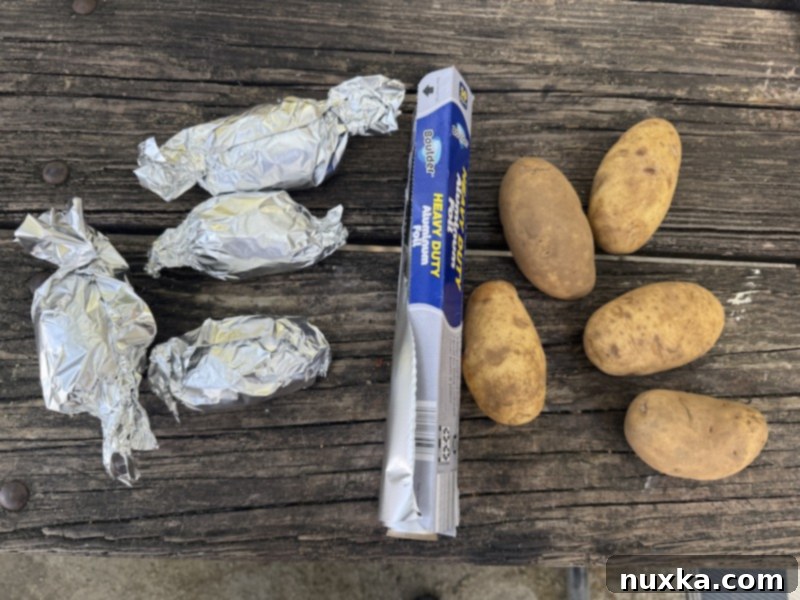
How To Bake a Potato in a Campfire: A Step-by-Step Guide
The secret to perfectly baked campfire potatoes lies in proper fire management. It’s essential to get your fire established first, allowing it to burn down into hot, glowing coals. Avoid cooking potatoes directly over high flames, as this will quickly char the outside while leaving the inside raw. When you see a bed of consistent, glowing embers, your fire is ready for cooking.
- Prepare Your Potatoes: Start by thoroughly washing your Russet potatoes, especially if you plan on eating the skins (which many campers enjoy for extra nutrients and flavor!). Pat them completely dry. Then, prick each potato several times with a fork. This step allows steam to escape during cooking, preventing the potato from exploding. Finally, double wrap each potato securely with heavy-duty aluminum foil. The double layer provides extra protection against direct heat and helps the potatoes cook evenly.
-
Build a Hot Coal Bed: Once your firewood has burned down and produced glowing embers, it’s time to create your cooking zone. Use a long-handled shovel designed for hot fires, or a sturdy, long stick you find at the campground, to gather the hot coals into a compact pile. This concentrates the heat, ensuring efficient cooking and helping to maintain a consistent temperature for your potatoes.
- Cook Over Embers: Carefully place the double-wrapped potatoes directly onto the bed of hot embers. There’s no need to bury them completely, just ensure they are nestled firmly within the glowing coals. For medium-sized Russet potatoes, cook for approximately 45 minutes, turning them every 15 minutes to ensure even cooking. For larger or jumbo-sized Russet potatoes, you may need an additional 5-10 minutes of cooking time. The key is consistent heat and regular turning.
- Check for Doneness & Rest: Using your long grilling tongs or sturdy sticks, carefully remove the baked potatoes from the fire and transfer them to a wooden picnic table or a heat-safe surface. Before serving, let the potatoes rest in their foil wraps for about 10 minutes. This crucial resting period allows the internal temperature to equalize, resulting in a perfectly tender interior, and also makes them easier and safer to handle.
- Serve and Enjoy: While the potatoes are resting, arrange all your delicious toppings to create a fun and interactive “potato bar.” Lay out the paper plates, butter, sour cream, cheese, bacon bits, and any other desired additions. Let everyone unwrap their own potato and load it up with their favorite toppings. Enjoy this simple, satisfying, and utterly delicious campfire meal!
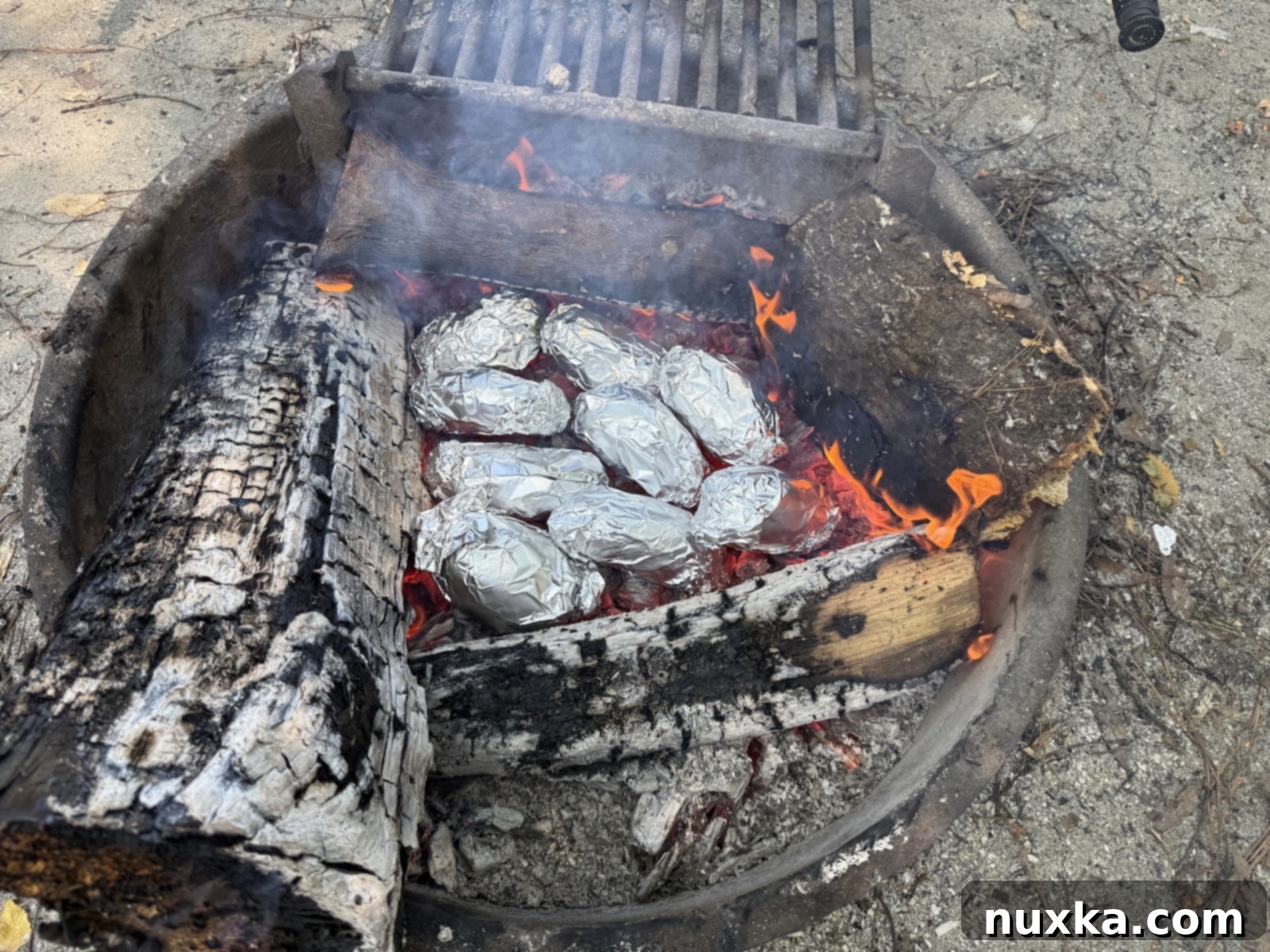
Note on Serving: These campfire baked potatoes, especially when loaded with hearty toppings, are incredibly filling and can easily serve as a delicious main course. However, if you prefer to serve them as a side dish, consider pairing them with another protein source like grilled bratwursts, flavorful shish kabobs, or juicy grilled chicken thighs for a complete and balanced meal.
Pro Chef Tip for Campfire Cooking

Pro-Tip: Always opt for heavy-duty aluminum foil over regular household foil when cooking directly in campfire embers. Heavy-duty foil is significantly thicker and more robust, providing an essential protective barrier. Double-wrapping your potatoes with this sturdy foil is key to preventing them from burning or tearing, ensuring the potatoes cook thoroughly and evenly without charring from the intense heat of the embers. This small step makes a big difference in the final outcome!
Leftovers and Reheating Campfire Baked Potatoes
While freshly cooked campfire baked potatoes are undeniably at their peak right off the coals, sometimes leftovers happen! To avoid excess, a good rule of thumb is to bake one medium-sized potato per adult, or one for every two toddlers if serving halves. It’s true that reheated baked potatoes often don’t taste quite as good as when they are piping hot and fresh. However, if you find yourself with extras, there are effective ways to enjoy them later.
For reheating, if you have access to an RV oven, simply place the foil-wrapped potatoes inside and bake at 350°F (176°C) for approximately 20 minutes, or until heated through. If you’re still camping and want to enjoy them over the fire again, store leftovers securely wrapped in their foil and place them in an ice cooler to keep them chilled for 1-2 days. When ready to reheat, simply place them back over the hot embers for 10-15 minutes, turning occasionally, until they are warm throughout. This method works surprisingly well for bringing back some of that campfire magic!
Understanding Campfire Cooking Times: How Long Do Baked Potatoes Take?
When planning your campfire meal, it’s important to factor in the time it takes to prepare the fire itself, in addition to the potato cooking time. If you’re starting a fire from scratch, plan for at least 30 minutes before your fire is ready for cooking. We typically build our fire using a tee-pee method: starting with highly flammable materials like straw, shaved bark (which my husband expertly trims from firewood with his axe), or dry pine needles (paper or thin sticks also work well as kindling). We then place 3-4 thinner pieces of firewood around the tee-pee, standing them upright, and light the inside. The fire will begin to burn nicely.
My husband often uses a small blower to get the fire going quickly and efficiently. Once the kindling and smaller wood are burning well, we add larger firewood pieces, two at a time, allowing them to burn down into a consistent bed of glowing embers. This is the ideal heat source for baking potatoes, as direct flame can lead to burning. From the moment you place your potatoes on these hot embers, it takes approximately 45 minutes for medium-sized Russet potatoes to cook through. Remember to turn them periodically for even cooking and check for doneness by squeezing them gently (carefully, through the foil!) – they should feel soft.
Frequently Asked Questions (Q&A) About Campfire Baked Potatoes
Can I Use a Gas Grill to Make Baked Potatoes?
Absolutely! If a campfire isn’t an option, a gas grill is an excellent alternative for baking potatoes. To achieve even cooking without burning, you’ll want to create a two-zone cooking environment. Turn on only one side of your gas grill to create a hot zone, leaving the other side unlit. Wrap your potatoes securely in heavy-duty foil, then place them on the unlit side (indirect heat) of the grill. Close the lid and cook, rotating every 15-20 minutes, until tender. This method ensures they cook thoroughly without getting scorched.
How Do I Make Baked Potatoes in a Charcoal Grill?
Cooking baked potatoes in a charcoal grill is very similar to using a gas grill, requiring a two-zone fire. First, light your charcoal and, once it’s covered in ash and glowing hot, shovel all the hot coals to one side of the grill, leaving the other side completely empty. This creates a direct heat zone and an indirect heat zone. Place your double-wrapped potatoes on the empty, indirect heat side of the charcoal grill. Cover the grill with the vents open to allow airflow, and cook for up to an hour and a half, checking for doneness around the 50-minute mark. If you’re short on time, you can also place the double-wrapped potatoes directly over the hot coals, cooking for about 40 minutes, but be vigilant and turn them frequently to prevent burning.
How Do I Know When My Campfire Potato is Done?
The best way to check for doneness is by gently squeezing the foil-wrapped potato with your grilling tongs or a thick oven mitt. A perfectly cooked baked potato will feel uniformly soft and tender all the way through. If you feel any hard spots, it needs more cooking time. You can also carefully unwrap a small section and insert a sharp knife or fork; it should slide in easily with no resistance. Be cautious, as the potato and steam will be very hot!
What Type of Wood is Best for Campfire Cooking?
Hardwoods like oak, hickory, maple, and fruitwoods (apple, cherry) are generally best for cooking. They burn longer, create excellent, consistent embers, and impart a subtle, pleasant smoky flavor without overpowering your food. Avoid softwoods like pine or fir, as they burn quickly, produce more smoke and soot, and can leave an unpleasant resinous taste on your food. Always use well-seasoned, dry wood for a cleaner, more efficient burn.
Have you made these incredible campfire baked potatoes, or did you find this post helpful for your outdoor cooking adventures? It would mean the world to us if you could rate and comment below for fellow readers to discover this fantastic recipe! Your feedback helps our community grow.
Recipe Card with Step-by-Step Instructions:
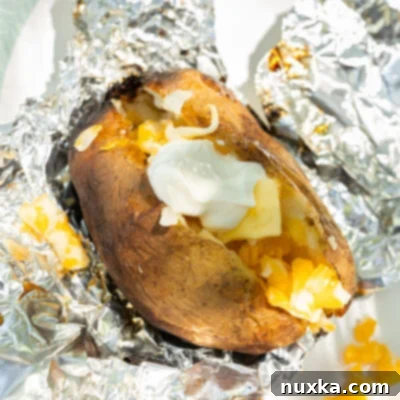
Rate
Pin
Campfire Baked Potatoes
Equipment
-
Heavy-duty aluminum foil
-
1 sharp knife
-
Set of heavy-duty disposable plates
-
Long grilling tongs or sturdy sticks
Ingredients
Ingredients:
-
8 medium Russet potatoes
-
8 oz sour cream
-
8 oz shredded cheddar cheese or Colby Jack blend
-
2 oz salted butter (preferably Irish butter)
-
Optional: bacon bits or cooked and crumbled bacon
-
Optional: fresh chives or green onions
-
Optional: salt and pepper to taste
Instructions
Directions:
-
 Wash potatoes thoroughly if you intend to eat the skins. Otherwise, prick each Russet potato several times with a fork and double wrap them securely with heavy-duty aluminum foil.
Wash potatoes thoroughly if you intend to eat the skins. Otherwise, prick each Russet potato several times with a fork and double wrap them securely with heavy-duty aluminum foil. -
 Ensure your campfire has burned down to hot embers (glowing hot coals, no high flames). Carefully place the wrapped potatoes directly over these embers and cook for approximately 45 minutes, turning every 15 minutes for even cooking.
Ensure your campfire has burned down to hot embers (glowing hot coals, no high flames). Carefully place the wrapped potatoes directly over these embers and cook for approximately 45 minutes, turning every 15 minutes for even cooking. -
 Using long tongs or sturdy sticks, remove the baked potatoes from the campfire and place them on a wooden picnic table or heat-safe surface. Let them rest in their foil for 10 minutes. While resting, arrange your paper plates and all desired toppings (salted butter, sour cream, shredded cheddar cheese, bacon bits, etc.) for a self-serving potato bar.
Using long tongs or sturdy sticks, remove the baked potatoes from the campfire and place them on a wooden picnic table or heat-safe surface. Let them rest in their foil for 10 minutes. While resting, arrange your paper plates and all desired toppings (salted butter, sour cream, shredded cheddar cheese, bacon bits, etc.) for a self-serving potato bar. -
 After resting, let everyone unwrap their potato and load it with their desired toppings. Enjoy your customized, warm, and delicious campfire baked potatoes!
After resting, let everyone unwrap their potato and load it with their desired toppings. Enjoy your customized, warm, and delicious campfire baked potatoes!
Notes
- For an extra layer of flavor and texture, top your baked potatoes generously with crispy bacon bits or freshly cooked and crumbled bacon.
- Allowing the baked potatoes to rest for 10 minutes in their foil wraps after cooking is crucial. This helps them cool down slightly, making them much easier and safer to handle and load with toppings without burning your fingers.
- These Campfire Baked Potatoes, especially when laden with hearty toppings, are substantial and designed to be a main course meal due to their filling nature.
- If you opt for unsalted butter, remember to provide salt and pepper shakers at your picnic table so guests can season their potatoes to their liking.
- Create an inviting “potato bar” experience! Arrange the paper plates, hot baked potatoes, and all your chosen toppings in an organized line on the edge of the table, allowing everyone to easily serve themselves.
- Get creative with your potato bar! Leftover taco meat makes an excellent topping for “loaded potato haystacks.” You could even take inspiration from Mennonite cooking and serve them with a homemade cheese sauce. If you make my campfire Woof’em Sticks (Campfire tacos), consider saving some leftover taco meat to transform your baked potatoes into a fantastic meal the next day. Yum!
Nutrition per serving
